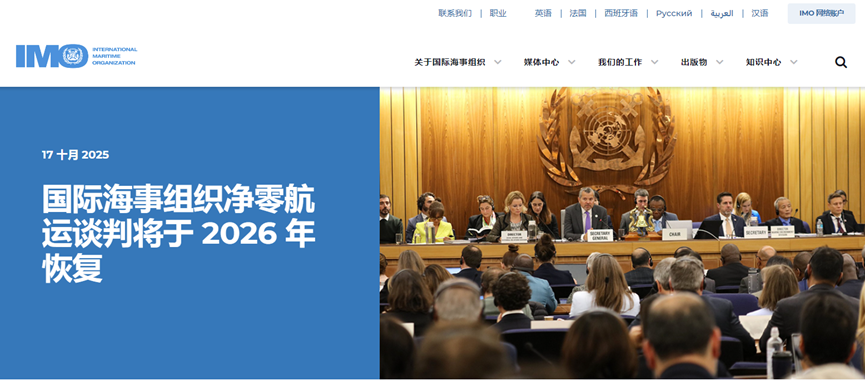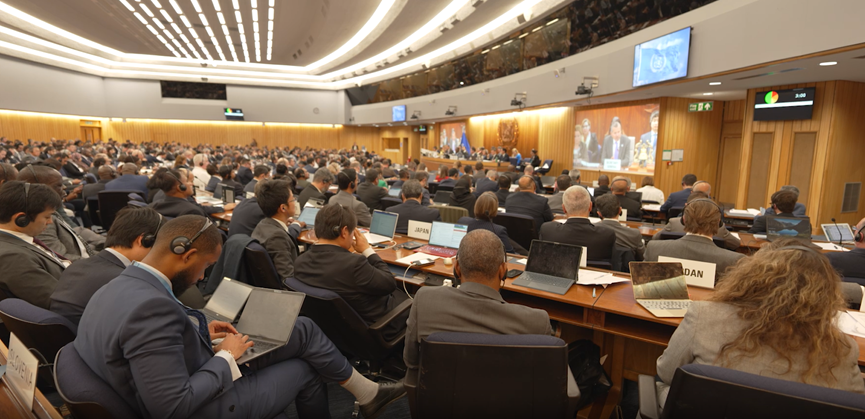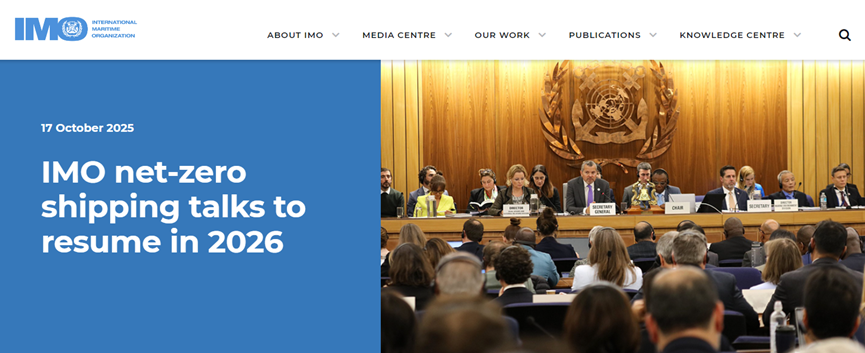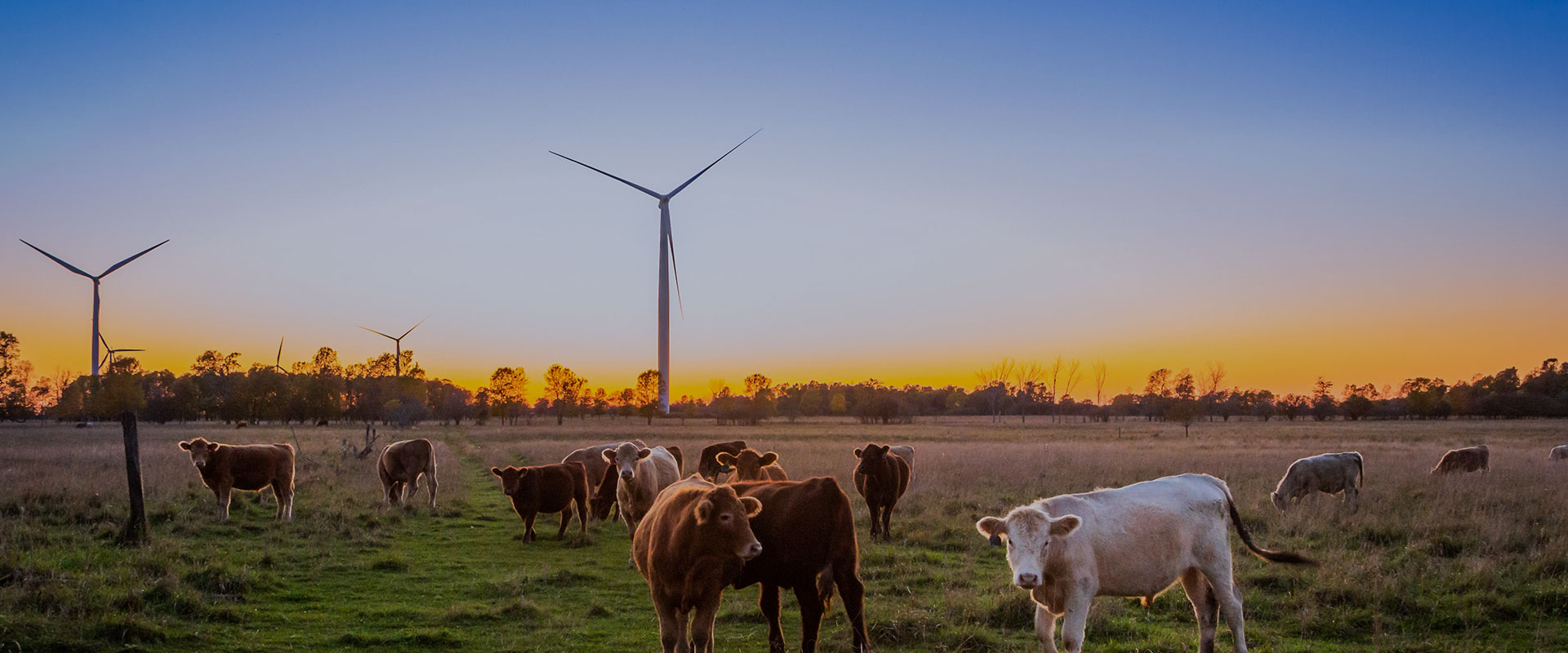赞成者与反对者博弈激烈!国际海事组织(IMO)净零排放框架(NZF)推迟一年再决定
 返回
返回
【中文为自动翻译,仅供参考,以英文原文为准】

国际海事组织海洋环境保护委员会投票决定将净零排放框架的讨论推迟一年。
国际海事组织 (IMO) 已同意休会本周(2025 年 10 月 14 日至 17 日)召开的海洋环境保护委员会 (MEPC) 特别会议,以审议通过《防污公约》附件 VI 修正案草案,包括 IMO 净零框架。
特别会议将在12个月后重新召开。在此期间,成员国将继续努力就国际海事组织净零框架达成共识。
闭会期间减少船舶温室气体排放工作组定于2025年10月20日至24日举行会议,将继续就实施净零框架的指导方针开展工作。
国际海事组织净零框架在 2025 年 4 月的海保会第 83 届会议上获得批准,作为《防止船舶污染国际公约》(MARPOL) 修订附件六草案的新第 5 章。它包括一套旨在减少船舶温室气体排放的国际法规,符合国际海事组织 2023 年减少船舶温室气体排放战略。它包括两个关键要素:全球燃料标准和全球温室气体排放定价机制。


国际海事组织在经过激烈的投票后暂停了净零排放框架一年,在航运和贸易领域发出了复杂的信号
国际海事组织 (IMO) 投票决定将其净零排放框架 (NZF) 的通过推迟一年,将一项具有里程碑意义的海事脱碳决定推迟到 2026 年。
该动议由新加坡提出并由沙特阿拉伯提议表决,于 2025 年 10 月 14 日至 17 日在伦敦举行的海洋环境保护委员会第二届特别会议 (MEPC/ES.2) 的最后一天获得通过。
结果非常接近,足以让航运界所有人大吃一惊。
投票结果为:赞成 57 票,反对 49 票,弃权 21 票,8 票未出席。获得通过需要的简单多数票为54 票。
特别会议现休会12个月,秘书处的任务是在一年后重新召开。
国际海事组织秘书长阿尔塞尼奥·多明格斯(Arsenio Dominguez )在闭幕词中说:“我总是在事物中寻找一线希望。尽管你们有不同的意见,但你们都发言支持这个组织的工作。我请你们反思这次会议。结果是你的决定。
“这不是正常的国际海事组织会议,我知道这对许多人来说是一个敏感话题,对所有人来说也是一个重要的话题。我之所以请你们不要鼓掌,是因为本届没有赢家和输家。
“现在你有一年的时间,你将继续在这些修正案的几个方面工作。你有一年的时间进行谈判和交谈,并达成共识,并参考这些时间。
“在我们即将结束之际,我恳求你们不要在未来的讨论中重复我们在其他讨论中处理这次会议的方式。但要继续积极主动。让我们都借此机会从中吸取教训,重新开始一年,准备进行谈判,并采取后续步骤,以实现你们都同意的 2023 年温室气体战略中设定的目标。
净零排放框架是争议的焦点,该框架原定于从 2028 年开始生效,适用于总吨超过 5,000 吨的船舶。
净零排放框架设定了具有约束力的目标,以降低船用燃料的碳强度,并建立了信用和罚款的市场机制。超过排放限值的船舶将不得不购买“补救装置”,而低排放船舶可以赚取和交易剩余信用额度。然后,这笔资金将流入国际海事组织净零基金,旨在支持清洁燃料的采用并支持发展中国家的公正转型。
根据全球战略传播委员会(Global Strategic Communications Council)的数据,在4月份的原则性投票后,绝大多数国家已经准备好签署该方案,当时有63个国家支持该方案,包括欧盟27国、巴西、中国、印度、加拿大、英国、韩国和日本,而16个国家反对。本周,随着地缘政治压力的上升和程序策略博弈进入中心舞台,这一势头动摇了。
在会议的筹备过程中和整个会议期间,美国都强化了自己的立场。发展中国家代表团报告说,各国首都受到“欺凌”、“前所未有的”和“非外交”压力,如果它们支持该框架,就会被加征关税和制裁。
美国总统唐纳德·特朗普公开在Truth Social上发帖称:“我对国际海事组织本周在伦敦投票通过全球碳税感到愤怒。
该帖子升级,将净零排放框架视为全球绿色新航运诈骗税,并警告美国不会“以任何形式”遵守。他还敦促成员国在周五的会议上“与美国站在一起并投反对票”。
华盛顿和利雅得还试图将国际海事组织典型的基于协商一致的通过重新塑造为一个更“明确”的进程,这将增加实施障碍,特别是对发展中经济体而言。虽然程序上的改变并没有成功,但通过争取时间,对更广泛的延迟起到了大致相同的作用。
这段时间是促成共识还是只是加强游说,现在是核心问题。一些代表团认为,暂停可能会加强技术指导,并加强对这种规模的法律的政治支持。其他人则担心美国将利用这个窗口加大对脆弱国家的压力,并破坏 4 月份成立的联盟。
美国8月11日提交的一份文件认为,净零排放框架将征收事实上的全球碳税,对消费者造成通货膨胀的连锁反应,零和近零(ZNZ)燃料在商业上仍然大规模稀缺。它表示,温室气体燃料强度 (GFI) 指标的轨迹可能会对液化天然气和某些生物燃料等过渡燃料造成不利影响,尽管它们有立即减排效果并且已经砸下投资。
该文件还警告说,净零基金的收入积累“过多”——“至少在数百亿美元”——没有明确的管理和使用规则,并呼吁制定指导方针,使收入与减少海事排放和缓解转型成本紧密联系,而不是进行更广泛的再分配。
对于供应链领导者来说,延迟改变了时间表,但不会改变方向。
监管弧线仍然转向碳定价和生命周期燃料指标。采购团队应假设海运的范围 3 排放风险将面临不断上升的碳成本,即使开始日期不确定。
拥有多元化燃料策略和可靠效率计划的船运人将在排放交易市场到来时保持贸易优势。租船人应收紧分配碳价格和履约风险的条款。投资于甲醇、氨和岸电和泊位准备的港口和第三方物流公司还有一年的时间使资本支出与可能的规则保持一致。
当海洋环境保护委员会明年重新召开会议时,同样的基本面也将等待着;一个加速燃料转型的基金,一个推动全球 80% 贸易的部门,在气候雄心与可负担性和能源安全之间进行权衡博弈。
额外的时间是带来清晰度,还是只是一场更大的风暴,将取决于未来 12 个月内各国首都和会议室中会发生什么。

The International Maritime Organization (IMO) has agreed to adjourn the extraordinary session of the Marine Environment Protection Committee (MEPC), which was convened this week (14 to 17 October 2025) to consider the adoption of draft amendments to MARPOL Annex VI, including the IMO Net-Zero Framework.
The extraordinary session will be reconvened in 12 months’ time. In the interim, Member States will continue to work towards consensus on the IMO Net Zero Framework.
The Intersessional Working Group on the Reduction on Greenhouse Gas Emissions from Ships, scheduled to meet 20 to 24 October 2025, will go ahead to continue work on the guidelines for implementing the Net Zero Framework.
The IMO Net-Zero Framework was approved at the MEPC 83 session in April 2025, as a new Chapter 5 of the Draft Revised Annex VI of the International Convention for the Prevention of Pollution from Ships (MARPOL). It comprises a set of international regulations aimed at reducing greenhouse gas (GHG) emissions from ships, in line with IMO's 2023 Strategy for Reduction of GHG Emissions from Ships. It includes two key elements: a global fuel standard and global GHG emissions pricing mechanism.

The International Maritime Organization has paused the Net-Zero Framework for a year after a tight vote, sending mixed signals across shipping and trade
The International Maritime Organization (IMO) has voted to delay adoption of its Net-Zero Framework (NZF) by one year, pushing a landmark decision on maritime decarbonisation into 2026.
The motion, tabled by Singapore and brought to a vote by Saudi Arabia, passed on the final day of the Marine Environment Protection Committee’s second extraordinary session (MEPC/ES.2), held from 14 to 17 October 2025 in London.
The outcome was close enough to raise eyebrows across boardrooms and bridge decks .
Votes were: Yes 57, No 49, Abstention 21, with 8 not present. A simple majority of 54 was required.
The extraordinary session is now adjourned for 12 months, with the Secretariat tasked to reconvene in a year.
In his closing remarks, IMO SG Arsenio Dominguez said: "I always look for the silver linings in things. Even though you have difference of opinions you all spoke in support of the work of this organization. I will ask you to reflect on this session. The outcome is your decision.
"This was not the normal IMO meeting and I know that it is a sensitive topic for many and important topic for all. The reason why I ask you not to clap is because there are no winners and losers in this session.
"Now you have one year you will continue to work on several aspects of these amendments. You have one year to negotiate and talk and come to consensus that you make reference to.
"As we come to an end my plea to you is not to repeat the way we have approached this meeting in other discussions for future discussions. But to continue to be proactive. Let’s all take this moment to learn from this come back fresh on one year ready to negotiate and take the next steps needed to address the goals which were set in the 2023 GHG strategy that you all agreed to."
At stake is a framework that would bite from 2028 and apply to ships over 5,000 gross tonnes.
The NZF sets binding targets to cut the carbon intensity of marine fuels and establishes a market mechanism of credits and penalties. Ships that overshoot emission limits would have to buy “remedial units” while low-emission vessels can earn and trade surplus credits. The money would then flow into an IMO Net-Zero Fund intended to back clean-fuel adoption and support a just transition in developing countries.
According to the Global Strategic Communications Council, a clear majority of countries had been ready to sign off after an in-principle vote in April, when 63 backed the package - including the EU27, Brazil, China, India, Canada, the UK, Korea and Japan - against 16 opposed. This momentum faltered this week as geopolitical pressure rose and procedural tactics took centre stage.
In the run-up and throughout the meeting, the US hardened its line. Delegations from developing countries reported “bullying”, “unprecedented” and “undiplomatic” pressure on capitals, with threats of tariffs and sanctions if they supported the framework.
US President Donald Trump then went public, posting on Truth Social: “I am outraged that the International Maritime Organization is voting in London this week to pass a global Carbon Tax.”
The post escalated, casting the NZF as a Global Green New Scam Tax on Shipping and warning that the US would not adhere “in any shape or form”. He also urged member states to “stand with the US and vote No” at Friday’s session.
Washington and Riyadh additionally sought to recast the IMO’s typical consensus-based adoption into a more “explicit” process that would add hurdles for implementation, particularly for developing economies. While that procedural change did not carry the day, the broader delay does much the same thing by buying time.
Whether that time enables consensus or simply intensifies lobbying is now the central question. Some delegations argue a pause could tighten technical guidance and shore up political support for a law of this scale. Others fear the US will use the window to increase pressure on vulnerable states and fracture the coalition that formed in April.
An 11 August submission from the US argued that the NZF would create a de facto global carbon tax, with inflationary knock-ons for consumers and that zero- and near-zero (ZNZ) fuels remain commercially scarce at scale. It said trajectories for the GHG Fuel Intensity (GFI) metric risked penalising transitional fuels such as LNG and certain biofuels, despite their immediate emissions gains and investment already sunk by owners.
The paper also warned of “excessive” revenue accumulation in the Net-Zero Fund - “at least in the tens of billions of dollars” - without clear guardrails for management and disbursement, and called for guidelines that keep revenue tied tightly to reducing maritime emissions and easing transition costs rather than broader redistribution.
For supply chain leaders, the delay changes timelines but not direction.
The regulatory arc still bends toward carbon pricing and lifecycle fuel metrics. Procurement teams should assume Scope 3 exposure from ocean freight will face a rising carbon cost, even if the start date is uncertain.
Shippers with diversified fuel strategies and credible efficiency programmes will keep a trading advantage when credit markets arrive. Charterers should tighten clauses that allocate carbon price and performance risk. Ports and 3PLs investing in bunkering and berth-side readiness for methanol, ammonia and shore power have another year to align capex with likely rules.
When the MEPC reconvenes next year, the same fundamentals will be waiting; a fund to accelerate fuel transition and a sector that moves 80% of global trade trying to square climate ambition with affordability and energy security.
Whether the extra time delivers clarity or simply a bigger storm will depend on what happens in capitals - and in the boardroom - over the next 12 months.
转自微信公众号:中外能源经济观察

